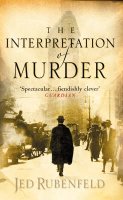Jed Rubenfeld – The Interpretation of Murder
 Title: The Interpretation of Murder
Title: The Interpretation of MurderAuthor: Jed Rubenfeld
ISBN # 9780755331420
Publisher: Headline Review
First Published: 2006
529 pages
Format: paperback
Rating: 7/10
The Interpretation of Murder is an inventive tour de force inspired by Sigmund Freud's 1909 visit to
The mark of a good book is when it spurs the reader on to do some further research for themselves and that is what happened with The Interpretation of Murder as I was intrigued enough to do a little basic research on Freud and Jung so I can get some background to their ideas and practices though, as I was not really very familiar with them other than very superficially. (I still wouldn’t claim to be anywhere near an expert now, but I enjoyed looking into their backgrounds and theories.)
There was one little bit I liked in particular, about great discoveries and "revolutionary bursts of genius" all occurring at the beginnings of centuries. I did find it funny, however, that Shakespeare writing Hamlet in 1600 was included in that, as 1600 was the last year of the 16th century, not the 1st year in the 17th - it kind of cracks the theory a little, but it did make me stop and think!
I especially liked that the narrative was in both third and first person (from the point of view of Stratham Younger). I wonder if getting to see his inner mind in particular was because the character is a psychoanalyst and makes a living trying to do just that with other people.
The mix of factual historical events, albeit occasionally slotted into a different timeframe to suit the story, gave it an air of realism that might otherwise have been lacking. I also thought I had sorted out a couple of red herrings and worked out the guilty party's identity. As it turned out, I was half-right and for some of the right reasons, but part of it took me completely by surprise, which is always nice with a murder mystery.


0 Comments:
Post a Comment
<< Home